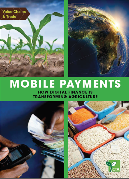Mobile payments: How digital finance is transforming agriculture
Leading up to the 2014 Fin4Ag – Revolutionising finance for agri-value chains international conference, the Technical Centre for Agricultural and Rural Cooperation (CTA) commissioned a study to explore the state of digital/mobile payments in agriculture.
The study was carried out using three case studies; SmartMoney from Uganda, NWK Agri-Services from Zambia, and Rice Mobile Finance (RiMFin) from Ghana.
2-3 October 2014. Kigali, Rwanda. Smart Rwanda Days 2014 - Digital Payments
SMART Rwanda Days is an annual event bringing together national and international stakeholders in the ICT sector – industry experts, policy makers, and development partners – to discuss how Rwanda can leverage Information Communication Technologies for economic transformation in line with Vision 2020.
Building on the successful SMART Rwanda Days 2013, and the Transform Africa Summit, last year’s SMART Rwanda Days provided a platform for stakeholders to discuss how ICT can contribute more significantly to Rwanda’s economic and social development. Download the programme.
Babcock, L.H. CTA, May 2015, 64 pages
Leading up to the 2014 Fin4Ag – Revolutionising finance for agri-value chains international conference, the Technical Centre for Agricultural and Rural Cooperation (CTA) commissioned a study to explore the state of digital/mobile payments in agriculture.
The study was carried out using three case studies; SmartMoney from Uganda, NWK Agri-Services from Zambia, and Rice Mobile Finance (RiMFin) from Ghana.
The report introduces the concept of digital finance by providing an overview
of the new technologies and business models that began only seven years
ago. The report’s findings provide an insight that portrays the nascent usage of
digital payments by users ranging from large agricultural commodity buyers to
the small-scale farmers at the bottom of the pyramid.
This research revealed various dynamics that ultimately position smallholder
farmers as an economically viable target market for mobile financial service:
- Large commodity buyers want to reduce the administrative, record keeping, security and other costs involved in using obsolete cash payment schemes while establishing a closer direct relationship with their farmers.
- In order to reduce their costs, large buyers are willing to invest in the rollout of mobile payments in rural areas where traditional mobile money – and commercial finance – models are not economically viable.
- In addition, MFSPs – who rely on a volume-based business model – can register new subscribers and increase their transaction fee income while farmers get the benefits of convenience, safety, security and their own financial identity
SMART Rwanda Days is an annual event bringing together national and international stakeholders in the ICT sector – industry experts, policy makers, and development partners – to discuss how Rwanda can leverage Information Communication Technologies for economic transformation in line with Vision 2020.
Building on the successful SMART Rwanda Days 2013, and the Transform Africa Summit, last year’s SMART Rwanda Days provided a platform for stakeholders to discuss how ICT can contribute more significantly to Rwanda’s economic and social development. Download the programme.
In the last 3 years the Government of Rwanda in partnership with financial institutions have worked to build a strong foundation for electronic payments resulting in the country now being part of global interoperable payment systems. Mobile money services are growing financial inclusion and electronic payments swiftly as evidenced by the number of users and the total volumes in mobile transactions. As a result more Rwandans are financially included. Additionally, POSs have grown from 40 in 2012 to over 1,000 today adding to the increase in electronic payments steadily. There are over 4.5 millions mobile payments subscribers; over 13,000 mobile money agents; over 500 bank branches + over 1000 bank agents and over 350 ATMs that giving more Rwandans have more access to places to digitize and access their monies. In 2013, Rwanda became the first country in the world to achieve interoperable mobile payments with the launch of mVISA – the world’s first mobile interoperable mobile payments platform that allows banks to reach underserved and unbanked populations.
While the encouragement of content creation and the development of access infrastructure are necessary components, evidence suggests that in Africa no more than 5% of Internet content is sourced locally, with the rest sourced internationally — including African
developed content that is hosted overseas. This is true for global sites, such as Facebook, and for local sites such as online
media and radio stations. This data must be delivered to Rwanda over international transit links, which add significant cost and
latency to the download, which in turn limit usage.



No comments:
Post a Comment